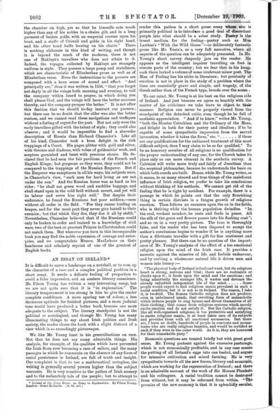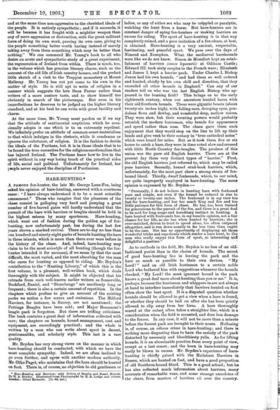AN ESSAY ON IRELAND.* IT is difficult to carve a
landscape on a nutshell, or to sum up the character of a race and a complex political problem in a short essay. It needs a delicate feeling of proportion to avoid a false impression, and an austere literary conscience. Mr. Filson Young has written a very interesting essay, .but we are not quite sure that it is "in explanation." The literary temperament is too strong in him to give the reader complete confidence. A more sparing use of colour, a .less dexterous aptitude for finished pictures, and a more judicial tone would have produced a better book, because one more adequate to the subject. The literary standpoint is not the political or sociological, and though Mr. Young has many illuminating things to say about Irish politics and Irish society, the reader closes the book with a slight distrust of a view which is so exceedingly picturesque.
We like Mr. Young least in his generalisations on race. Not that he does not say many admirable things. His analysis, for example, of the qualities which have prevented the Irish from ever becoming a race of sailors, and the many passages in which he comments on the absence of any force of social persistence in Ireland, are full of truth and insight: Our complaint is that, to use a mathematical metaphor, the writing is generally several powers higher than the subject warrants. He is very sensitive to the pathos of Irish scenery and to the melancholy tale of the people ; but to attempt to
• Ireland at the Cross Roads an Essay in Explanation. By Filson Young. London : Grant Richards. 13s. 6d. net.1
render this pathos in a short prose essay aim is
primarily political is to introduce a good deal of discordant purple into what should be a sober study. r =try is thy: truest medium for the feeling—poetry such as Miss Lawless's " With the Wild Geese "—or deliberately fantastip prose like Mr. Yeats's, or a very full narrative, where, all aspects of the question can be adequately presented. In M. Young's short survey rhapsody jars on the reader. qP appears as the intelligent inquirer travelling on foot ip remote parts of the country; but we fear that in his knap,- sack there lurked a volume of some irrelevant minor poet. Ths, Man of Feeling has his niche in literature ; but preciosity of emotion is not in place in the study of a problem where the lines are essentially grave and simple, and tragedy, of, the Greek rather than of the French type, broods over the scene..
To our mind, Mr. Young is at his best on the religious side of Ireland. And just because we agree so heartily with the matter of his criticisms we take leave to object to their manner. Religion can never be properly viewed from the standpoint of the detached critic, even though he be full of aesthetic appreciation. " And if to know," writes Mr. Young, "both the Shorter Catechism and the Ordinary of the Mass, and delight in both for their poetry and idealism; if to be capable of some sympathetic impression from the sacred these
most ss
invocation, whether it takes the form," etc. "
are any qualifications for the unbiassed treatment of this h m difficult subject., then I may claim to be so far qualified." To be an honorary member of all religions is no qualification for the proper understanding of any one, for the Church takes its place only as one more element in the aesthetic survey. A. Calvinist will write more truly and fairly of Jesuitism than the sceptical philosopher, because he understands the basis on which both creeds are built. Hence, while Mr. Young writes, as it seems, to us many shrewd and true things of the maleficent influence of Irish religion, we prefer to take his conclusions without thinking of his methods. We cannot get rid of the feeling that he is right by accident. For example, there is a. passage in which he points out that the only flourishing thing in certain districts is a fungus growth of religious emotion. Then follows an excursus upon the ox in the fields, who is thriving while the human population dwindles. "In the cool, verdant meadow, he rests and feeds in peace. All the silk of the grass and flowers passes into his flashing coat "; and so on in a very pretty picture. The tone is thoroughly false, and the reader who has been disposed to accept the author's conclusions begins to wonder if he is anything more than a dilettante traveller with a gift for fine sentiment and pretty phrases. But there can be no question of the import- ance of Mr. Young's analysis of the effect of a too emotional religion upon the mind of the Irish race. It provides a narcotic against the miseries of life and forbids endeavour, and by curbing a wholesome natural life it drives men and women into lunacy :— " The physical body of Ireland is frail and weak, but its religious heart is strong, nervous and vital ; there are no restraints or checks upon it ; it feeds upon the mind and the emotions; and being admittedly the stronger life, it wastes and devours the already enfeebled independent life of the mind. Some people would expect to find religious mania prevalent in such a. social condition, but it is not so in Ireland. The reason, I take it, is twofold. The Roman Catholic religion does not produce, even in unbalanced minds, that revolting form of melancholia which induces people to sing hymns and divest themselves of all their clothing ; that comes from religious systems which merely excite emotion and do not satisfy it. But the Catholic religion,. like all well-organised religions, is too protective and satisfying to excite religious mania; it at least takes care of its subjects• and provides them with all emotional necessaries. But there are, I have no doubt, hundreds of people in convents and monas- teries who are really religious lunatics, and would be certified as such if they were in the outer world. As it is, they are honoured for their remarkable piety."
Economic questions are treated briefly but with great good sense. Mr. Young protests against the excessive pasturage, which is not economically profitable, and in any case means the putting of all Ireland's eggs into one basket, and argues for intensive cultivation and mixed farming. He is very sympathetic towards all the new forces, literary and economic, which are working for the regeneration of Ireland; and there is an admirable account of the work of Sir Horace Plunkett and his colleagues. A racial tradition cannot be destroyed from without, but it may be reformed from within. "Tee promise of the new economy is that it is splendidly secular,
and at the same time non-aggressive to.the cherihhed ideals of the people. It is entirely sympathetic ; and if it succeeds, it will be because it has fought with a mightier weapon than any of mere aggression or destruction, with the great militant force of doing its own work, proving its own .case, giving to the people something better worth having instead of merely taking away from them something which may be better than nothing." We can commend Mr. Young's book to all who desire an acute and sympathetic study of a great experiment, the regeneration of Ireland from within. There is much, too, in the volume which has genuine literary charm, such as the account of the old life of Irish country houses, and the perfect little sketch of a visit to the Trappist monastery. at Mount Melleray. Mr. Young has not yet come to his own in the matter of style. He is still apt to write of religion in a manner which suggests the late Dean Farrar rather than writers of a more austere taste, and to show himself too obviously in search of the picturesque. But 'even in his imperfections he deserves to be judged on the higher literary standard, and at his best he can write with great lucidity and charm.
At the same time, Mr. Young must pardon us if we say that the attitude of sentimental scepticism which he occa- sionally adopts is one which is to us extremely repellent. We infinitely prefer an attitude of common-sense materialism to that which indulges in the rhetoric, while it condemns or ignores the substance, of religion. It is the fashion to deride the ideals of the Puritans, but it is in those ideals that is to be found the true corrective for the religious emotionalism that has injured Ireland. The Puritans knew hovito live in the spirit without in any way losing touch of the practical sides of life, social and political. Unfortunately for Ireland, her people never enjoyed the discipline of Puritanism.



















































 Previous page
Previous page